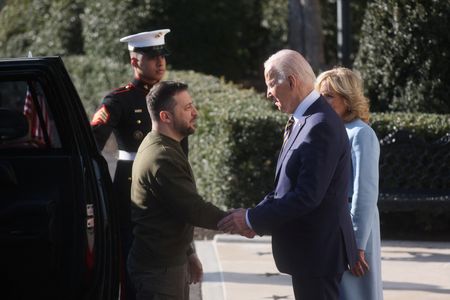By Steve Holland and Pavel Polityuk
WASHINGTON/KYIV (Reuters) – President Volodymyr Zelenskiy told the U.S. Congress on Wednesday that aid to Ukraine is an investment in democracy, not charity, and invoked American victory over the Nazis in a key World War Two battle to press for continued assistance.
Zelenskiy, on his first foreign wartime visit, wore his trademark olive green pants and sweater, and earlier met President Joe Biden, who urged support to keep flowing in 2023, when congressional approval for Ukrainian aid will be harder.
The United States has sent about $50 billion in assistance to Kyiv as Europe’s biggest land conflict since 1945 drags on, killing tens of thousands, driving millions from their homes and reducing cities to ruins. On Wednesday, it pledged to provide Patriot missiles.
But some Republicans, who will take control of the House of Representatives from Democrats on Jan. 3, have expressed concerns about the price tag. They could hold up billions of dollars in war aid starting next month.
“Your money is not charity. It is an investment in the global security and democracy that we handle in the most responsible way,” Zelenskiy told a joint session of the U.S. Senate and House of Representatives, speaking in English.
The world was too interconnected to allow any country to stand aside and feel safe, he added.
Zelenskiy’s speech was aimed at softening the concerns of Republicans when they take over Congress and keeping U.S. public opinion on his side with reminders of the hardships his people face.
Members of Congress stood, cheered, applauded and shook Zelenskiy’s hand as he entered the chamber, with several wearing the colours of the Ukrainian flag, blue and yellow.
He received multiple standing ovations from an audience that also included members of the Ukrainian diaspora and religious figures.
Referencing former U.S. President Franklin D. Roosevelt, who served between 1933 and 1945, and efforts to liberate Europe from Nazi occupation, Zelenskiy also appealed to Americans as they gathered with family for Christmas.
“Just like the brave American soldiers, which held their lines and fought back Hitler’s forces during the Christmas of 1944, brave Ukrainian soldiers are doing the same to Putin’s forces this Christmas,” he said.
The Battle of the Bulge, which began in December 1944, was Hitler’s final major attempt to push back Allied forces. Poor weather hampered initial U.S. efforts to halt the offensive, leading to fatalities and threatening to divide the allies, who ultimately prevailed.
PATRIOT MISSILES
Earlier, Zelenskiy was greeted by Biden and first lady Jill Biden on the White House lawn and the two leaders appeared together at the Oval Office, followed by a news conference.
“As we head into the New Year, it’s important for the American people, and for the world, to hear directly from you Mr President about Ukraine’s fight and the need to continue to stand together through 2023,” Biden said.
Zelenskiy said: “The United States will stand up for our shared values, the values of freedom.”
U.S. Secretary of State Antony Blinken also announced the United States would provide another $1.85 billion in military aid for Ukraine including the highly advanced Patriot air defence system to help it ward off barrages of Russian missiles.
But some hard-line Republicans have urged an end to the aid for Ukraine, instead calling for an audit to trace how the money previously allocated has been spent.
The Patriot missile is deemed to be one of the most advanced U.S. air defence systems, offering protection against attacking aircraft as well as cruise and ballistic missiles.
Zelenskiy has repeatedly called on the West to supply more advanced weaponry, ranging from modern battle tanks to missile defence systems, but Western allies have been cautious, keen to minimise any risk of provoking wider conflict with Russia.
Zelenskiy earlier met Democratic and Republican leaders in the Senate and House of Representatives.
BATTLES RAGE ON
Some in Moscow expected the invasion of Ukraine to achieve a rapid victory but it has instead passed its 300-day milestone.
Ukraine has come under repeated Russian attacks targeting its energy infrastructure, leaving millions of people without electricity or running water in the dead of a freezing winter.
Zelenskiy has made a point of staying close to his people with daring trips to battlefronts and addresses to the nation nightly, countless calls with world leaders and videolink speeches to parliaments and international institutions.
White House National Security Council spokesman John Kirby said Washington was seeing no sign that Russian President Vladimir Putin was willing to engage in peacemaking.
The Kremlin said on Wednesday it saw no chance of peace talks with Kyiv. In a call with reporters, spokesman Dmitry Peskov said that continued Western arms supplies to Ukraine would lead to a “deepening” of the conflict.
Russian forces launched three missile attacks and an air strike on targets in the Zaporizhzhia region and continued to push to advance near Bakhmut and Avdiivka, the focal point of fighting in Donetsk region, the General Staff of the Ukrainian Armed Forces said on Wednesday evening.
Putin has said there were no financial limits on what the government would provide in terms of equipment and hardware, but the army had to learn from and fix the problems it had experienced in Ukraine.
He has backed a plan by his defence minister to boost the size of the armed forces by more than 30% to 1.5 million combat personnel.
Russia says it is waging a “special military operation” in Ukraine to rid it of nationalists and protect Russian-speaking communities. Ukraine and the West describe the Kremlin’s actions as an unprovoked war of aggression.
(Reporting by Reuters bureaus; Writing by Costas Pitas; Editing by Ross Colvin, Cynthia Osterman and Himani Sarkar)





